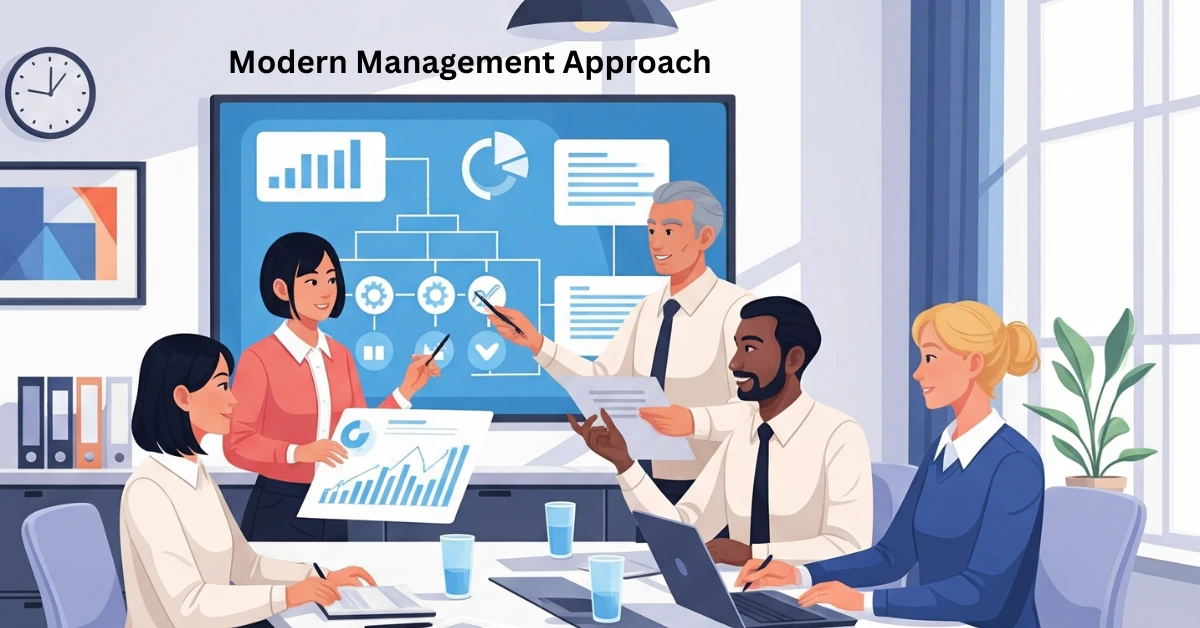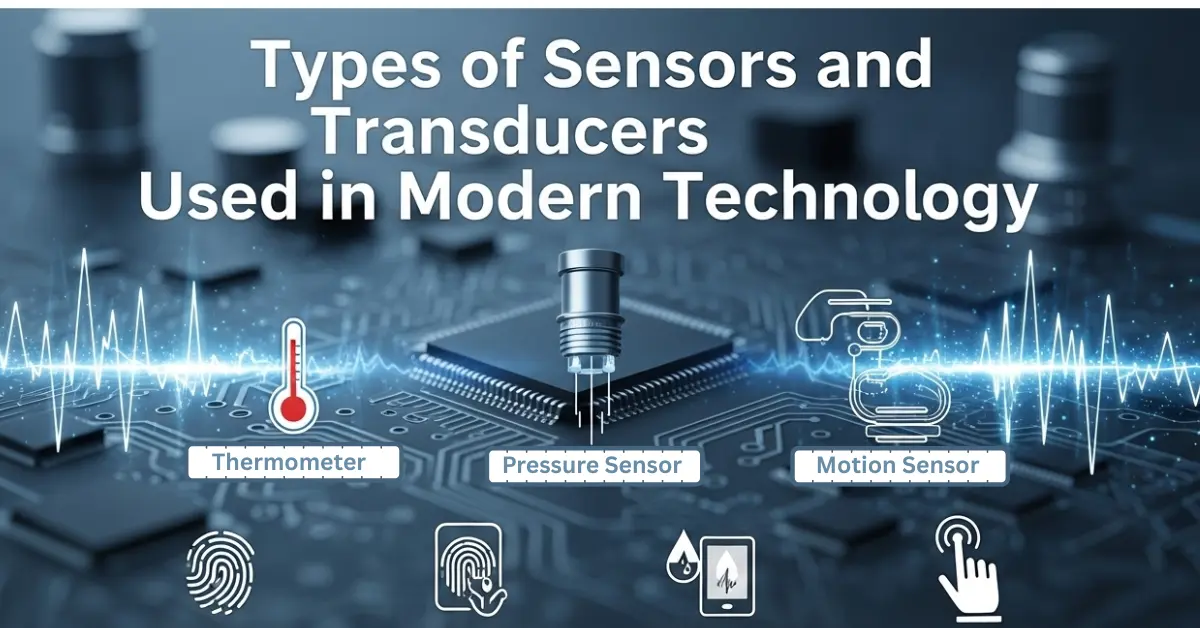Management is the backbone of every successful organization. Over the years, the way managers think, plan, and lead teams has evolved significantly. This shift has given rise to modern management theories, a set of ideas and practices that help managers understand how to make better decisions, motivate employees and improve performance.
What Are Modern Management Theories?
Modern management theories are frameworks that help leaders understand how to manage people, processes and resources effectively in today’s dynamic business environment. Unlike classical theories, which focused mostly on rules, structure and authority, modern theories consider human behavior, technology, communication and flexibility.
These theories emerged during the 20th century as the workplace began to change with the rise of technology, globalization and new employee expectations. They offer a more balanced and practical approach to dealing with real world problems in organizations.
Key Approaches of Modern Management Theories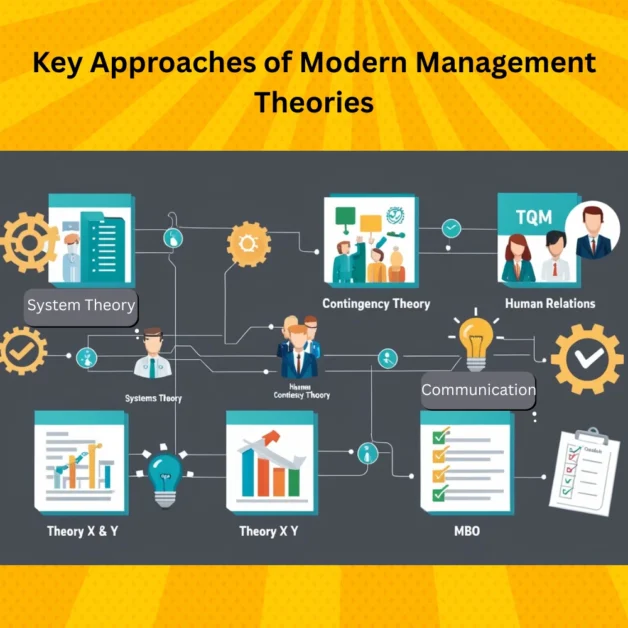
Let’s break down some of the most important approaches in modern management.
1. Systems Theory
This approach sees the organization as a system, a group of parts working together for a common goal. Each department, employee or process is a part of the system.
Main Ideas:
- All parts of the organization are connected.
- A change in one area affects the others.
- External factors like the market or economy also impact the system.
Benefits:
- Helps managers see the bigger picture.
- Encourages collaboration between departments.
- Useful for identifying problems and fixing them efficiently.
2. Contingency Theory
This theory suggests that no single management style works in every situation. The most effective approach depends on the specific context and conditions.
Main Ideas:
- A manager’s approach should adapt according to the nature of the task, the team involved and the surrounding conditions.
- Flexibility is key to success.
- Effective leaders adapt to different challenges.
Benefits:
- Allows organizations to be more responsive.
- Helps managers handle uncertainty and change better.
- Builds a culture of adaptability.
3. Human Relations Theory
This approach emphasizes the human side of management, stressing the value of employee well being, open communication and motivation alongside business processes.
Main Ideas:
- Happy employees are more productive.
- Good communication leads to better teamwork.
- Managers should listen and respond to workers’ needs.
Benefits:
- Boosts morale and motivation.
- Reduces employee turnover.
- Builds stronger workplace relationships.
4. Theory X and Theory Y (by Douglas McGregor)
This theory outlines two contrasting perspectives that managers can hold about their employees’ attitudes and behavior.
- Theory X: Some managers assume that employees lack motivation and require close monitoring to stay productive.
- Theory Y: Managers believe workers are responsible and enjoy their jobs.
Main Ideas:
- A manager’s belief influences how they treat employees.
- A positive outlook, as described in Theory Y, helps foster a more supportive and productive workplace.
Benefits:
- Helps managers become more aware of their mindset.
- Encourages trust and responsibility.
- Supports employee empowerment.
5. Total Quality Management (TQM)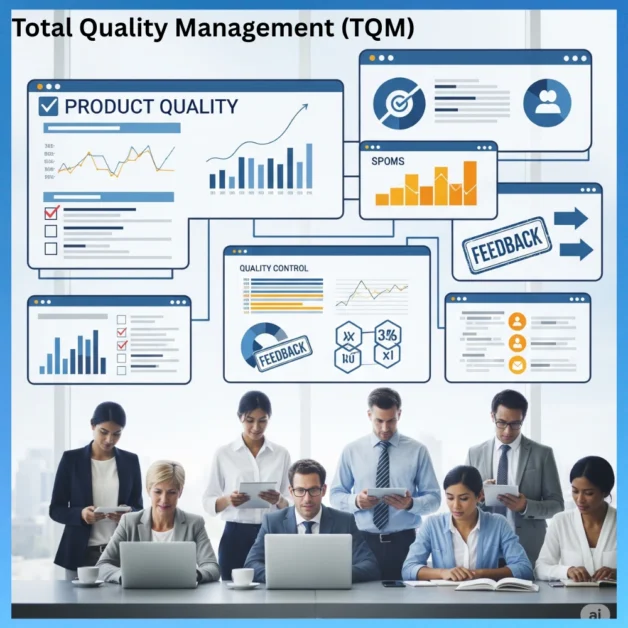
Total Quality Management (TQM) centers on ongoing improvement and meeting customer needs. It promotes a company-wide commitment to maintaining high standards of quality.
- Quality is everyone’s responsibility.
- Continuous improvement is better than one-time fixes.
- Focus on customer needs and feedback.
Benefits:
- Improves product and service quality.
- Builds customer trust and loyalty.
- Encourages teamwork and accountability.
6. Management by Objectives (MBO)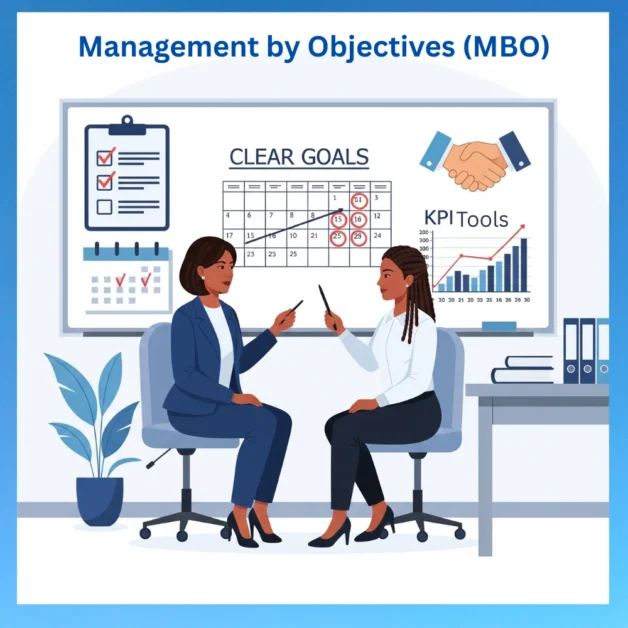
This theory, introduced by Peter Drucker, is about setting goals together. Managers and employees work as a team to define clear objectives.
Main Ideas:
- Goals should be specific and measurable.
- Everyone should know what success looks like.
- Regular feedback helps track progress.
Benefits:
- Aligns team efforts with company goals.
- Improves focus and productivity.
- Builds a sense of achievement.
Benefits of Modern Management Theories
Now that we’ve explored the main approaches, let’s talk about the overall advantages of applying modern management theories in the workplace.
1. Better Decision Making
Modern management theories provide managers with useful tools and frameworks to analyze situations and make smart choices. This leads to better planning, problem solving and risk management.
2. Improved Employee Engagement
By focusing on communication, motivation, and participation, these theories help create a more inclusive and positive work culture. When employees feel appreciated, it boosts their job satisfaction and enhances overall productivity.
3. Flexibility and Adaptability
Modern approaches like contingency theory prepare managers to handle change and uncertainty effectively. This is crucial in today’s fast moving business world where trends, technologies and customer needs shift quickly.
4. Enhanced Communication
Strong communication is a major theme in modern theories. Clear and open communication:
- Reduces misunderstandings
- Builds trust
- Promotes transparency
5. Customer Satisfaction
Strategies like TQM and MBO put customer needs at the center of management. By focusing on quality and service, companies can meet and exceed customer expectations, which is key to long term success.
6. Encourages Innovation
Modern theories don’t rely only on rules and traditions. Instead, they promote creativity and new ideas. Encouraging employees to be creative helps embed innovation into the organization’s culture.
Comparison of Modern Management Theories
| Theory | Main Focus | Key Benefits |
|---|---|---|
| Systems Theory | An organization as a system of interrelated parts | Holistic thinking, cross-functional coordination, effective problem-solving |
| Contingency Theory | Management depends on the situation | Flexibility, adaptive leadership, better crisis response |
| Human Relations Theory | Employee motivation and communication | Increased morale, better teamwork, stronger workplace relationships |
| Theory X & Theory Y | Manager’s belief about employee behavior | Promotes trust (Theory Y), improves productivity, builds a positive work culture |
| Total Quality Management (TQM) | Continuous improvement and customer focus | Enhanced quality, customer satisfaction, teamwork |
| Management by Objectives (MBO) | Setting and aligning goals collaboratively | Clear direction, performance tracking, employee involvement |
Real Life Applications of Modern Management Theories
Many companies successfully apply modern theories:
- Google: uses Human Relations Theory by offering flexible work environments and employee wellness programs.
- Toyota: implements TQM principles in its Lean manufacturing process.
- Amazon: applies Systems Theory to integrate logistics, tech, and customer service.
- Apple: uses MBO to set high level innovation goals and align teams.
These examples show how theoretical models turn into real competitive advantages.
Why Modern Management Theories Matter Today
In today’s world, where businesses face competition, economic shifts and rapidly changing technologies, modern management theories offer practical ways to stay on top.
These theories remind us that:
- People matter just as much as profits.
- Change is constant and must be embraced.
- Success comes from working together, setting goals, and learning continuously.
Challenges in Implementing Modern Management Theories
Although beneficial, these theories come with some challenges:
- Training managers to shift from traditional to modern styles
- Balancing flexibility with structure
- Changing corporate culture
- Ensuring consistent communication across departments
Overcoming these challenges requires leadership commitment, ongoing learning, and open communication.
The Future of Management
As the workplace continues to evolve with AI, hybrid work and digital transformation, modern theories will keep adapting. Future trends include:
- AI driven decision making supported by Systems Theory
- Emotional intelligence in leadership rooted in Human Relations Theory
- Hyper personalized goals and performance plans inspired by MBO
Modern managers must stay open to learning and evolving, embracing these theories not as rigid rules but as flexible frameworks.
Conclusion
Modern management theories offer a thoughtful blend of structure, flexibility and human understanding. They help managers not only to organize and control but also to inspire, engage and lead. Whether you run a small startup or a large corporation, applying these theories can improve how you manage people and processes.
